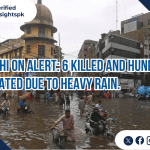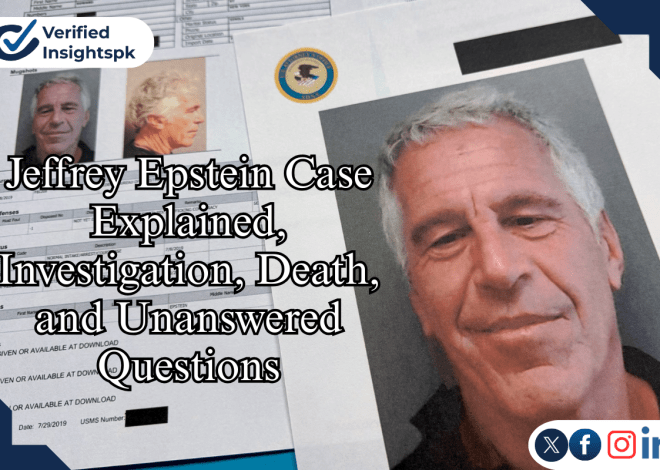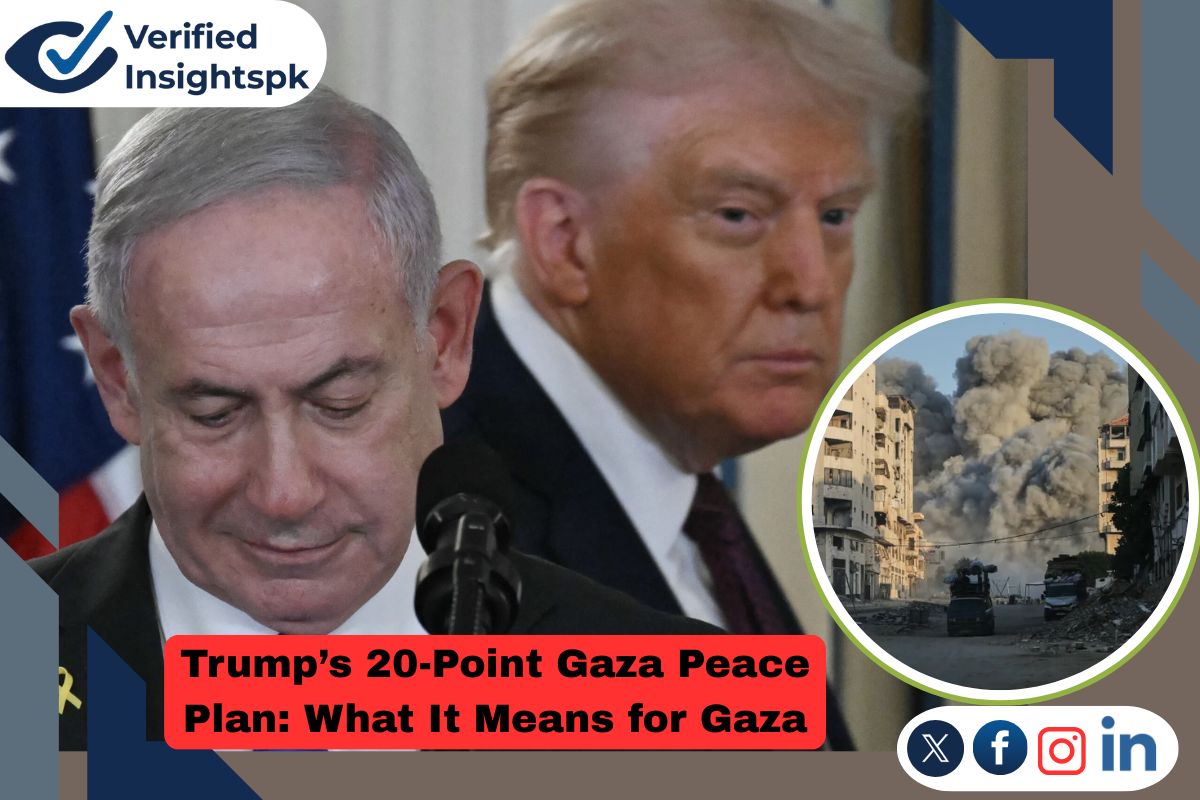
Trump’s 20-Point Gaza Peace Plan: What It Means for Gaza, Muslim Countries, Pakistan and Reality Check
Trump’s 20-Point Gaza Peace Plan: What It Means for Gaza, Muslim Countries, and Pakistan
Donald Trump has presented a 20-point peace plan to end the war in Gaza. Israel’s Prime Minister Benjamin Netanyahu has already accepted it, but Hamas has not given an official response yet.
The plan covers security, reconstruction, governance, and aid. It also involves regional countries, including Pakistan, to play a role. Here is a breakdown of the whole plan in simple terms, along with its impact on Gaza and the Muslim world.
Trump’s 20-Point Gaza Peace Plan
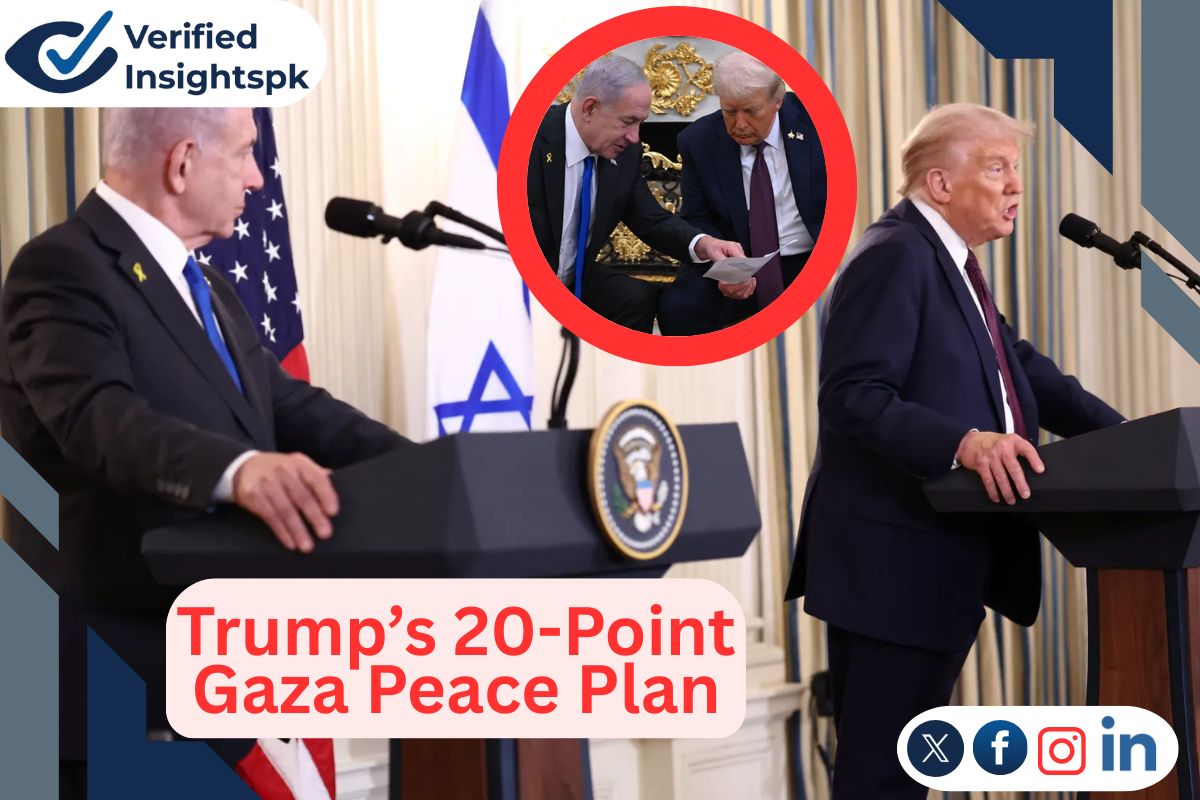
1. Gaza to Become Terror-Free Zone
Trump’s plan says Gaza must be free from radical groups and weapons.
Impact: This will bring peace for neighbours like Israel and Egypt, but also raise concerns about how disarmament will be carried out. For Gaza, it could mean safety, but also loss of control for Hamas. For Pakistan and other Muslim nations, it shows pressure to back anti-terror strategies.
2. Rebuilding Gaza for Its People
The plan promises to rebuild Gaza’s destroyed infrastructure and improve living conditions.
Impact: This could improve the lives of ordinary Gazans. It also opens up business and aid opportunities for Muslim countries, including Pakistan, in sectors such as construction, healthcare, and trade.
3. War Ends if Both Sides Agree
If both Israel and Hamas agree, the war will stop, and Israel will withdraw from some areas.
Impact: A ceasefire will save lives and stop destruction. For Muslim nations, especially Pakistan, it will ease diplomatic pressure to take sides.
4. Hostages Returned in 72 Hours
All Israeli hostages, alive or dead, will be returned within three days.
Impact: This may reduce Israeli aggression. For Gaza, it will mean relief from bombings. Muslim countries, such as Pakistan, can welcome this as a humanitarian step.
5. Prisoner Release by Israel
Israel will release 250 prisoners with life sentences and 1,700 Gazans detained after October 7, 2023.
Impact: Families in Gaza will reunite, improving morale. For Pakistan and other Muslim countries, this looks like a small but positive justice step.
6. Amnesty for Peaceful Hamas Members
Hamas members who give up weapons can stay peacefully or leave safely to another country.
Impact: This weakens Hamas militarily but offers it a means of survival. Pakistan may view this as a compromise, but it could also be a way forward for peace.
7. Immediate Humanitarian Aid
Once the deal is accepted, full aid, encompassing food, water, electricity, hospitals, and bakeries, will be provided to Gaza.
Impact: This will save lives immediately. Muslim countries, including Pakistan, can contribute through aid agencies.
8. Aid Through International Agencies
The UN, the Red Crescent, and other neutral groups will monitor aid. Rafah crossing will also open under these rules.
Impact: Gaza will get fair access to aid. For Pakistan, it ensures donations actually reach the people, not political groups.
9. Transitional Government for Gaza
A temporary Palestinian technocratic committee, supervised by Trump and Tony Blair, will run Gaza.
Impact: This reduces Hamas’ role and brings international oversight. For Muslim countries, it raises concerns about foreign dominance, but also presents an opportunity for stability.
10. Trump’s Economic Development Plan
A global expert team will prepare projects to create jobs and rebuild Gaza’s economy.
Impact: This could give Gazans work and hope. Pakistan and Muslim countries may find investment opportunities here.
11. Special Economic Zone
A new trade zone with low tariffs will be created for Gaza.
Impact: This boosts Gaza’s economy and regional trade. Pakistan could benefit if allowed to trade in this zone.
12. No Forced Displacement
No one will be forced to leave Gaza. Those who want to go or return will have the freedom to do so.
Impact: This ensures Gazans are not expelled to Egypt or elsewhere. Pakistan will support this initiative as it helps prevent a refugee crisis.
13. Hamas Excluded from Governance
Hamas will not govern Gaza. All tunnels and weapons will be destroyed.
Impact: Gaza will become demilitarized. Muslim countries may see this as reducing Palestinian independence but also as a way to end the conflict.
14. Guarantees by Regional Partners
Regional Muslim countries will ensure that Gaza remains peaceful and poses no threat.
Impact: Countries such as Egypt, Turkey, and Pakistan may be pressured into providing guarantees or troops.
15. International Stabilisation Force (ISF)
A temporary security force will deploy in Gaza to train Palestinian police, with help from Jordan and Egypt.
Impact: This shifts control from Hamas to an international group. Pakistan may face calls to deploy troops, a move that could be highly controversial.
16. Israel Will Not Occupy Gaza
Israel will not annex Gaza. Its troops will leave step by step as Gaza is demilitarized.
Impact: This is a positive sign for Palestinians. Pakistan will welcome it but remain cautious about how quickly Israel withdraws.
17. Partial Plan if Hamas Rejects
If Hamas rejects the plan, aid and rebuilding will continue in “terror-free” zones controlled by Israel and ISF.
Impact: Gaza could split into zones, weakening unity. Muslim countries may be divided on how to respond to the issue.
18. Interfaith Dialogue
A program for dialogue between Muslims, Jews, and Christians will be created to promote peace.
Impact: This could reduce hate but may face criticism from groups who distrust Israel. For Pakistan, it’s an opportunity to promote religious harmony, but with a careful balance.
19. Pathway to Palestinian Statehood
If Gaza is rebuilt and the Palestinian Authority reforms, there may finally be steps toward a Palestinian state.
Impact: This raises hopes for the Palestinians’ dream of independence. Pakistan will strongly support this initiative, as it aligns with the country’s long-standing policy.
20. US-Led Dialogue for Peace
The US will start talks between Israel and the Palestinians to create a long-term, peaceful future.
Impact: It could end decades of war, but many Palestinians doubt US neutrality. For Pakistan, it means staying diplomatically active in supporting Palestinian rights.
Reality Check
Are these Trump’s 20-Point Plan being implemented, or just Unrealistic promises?
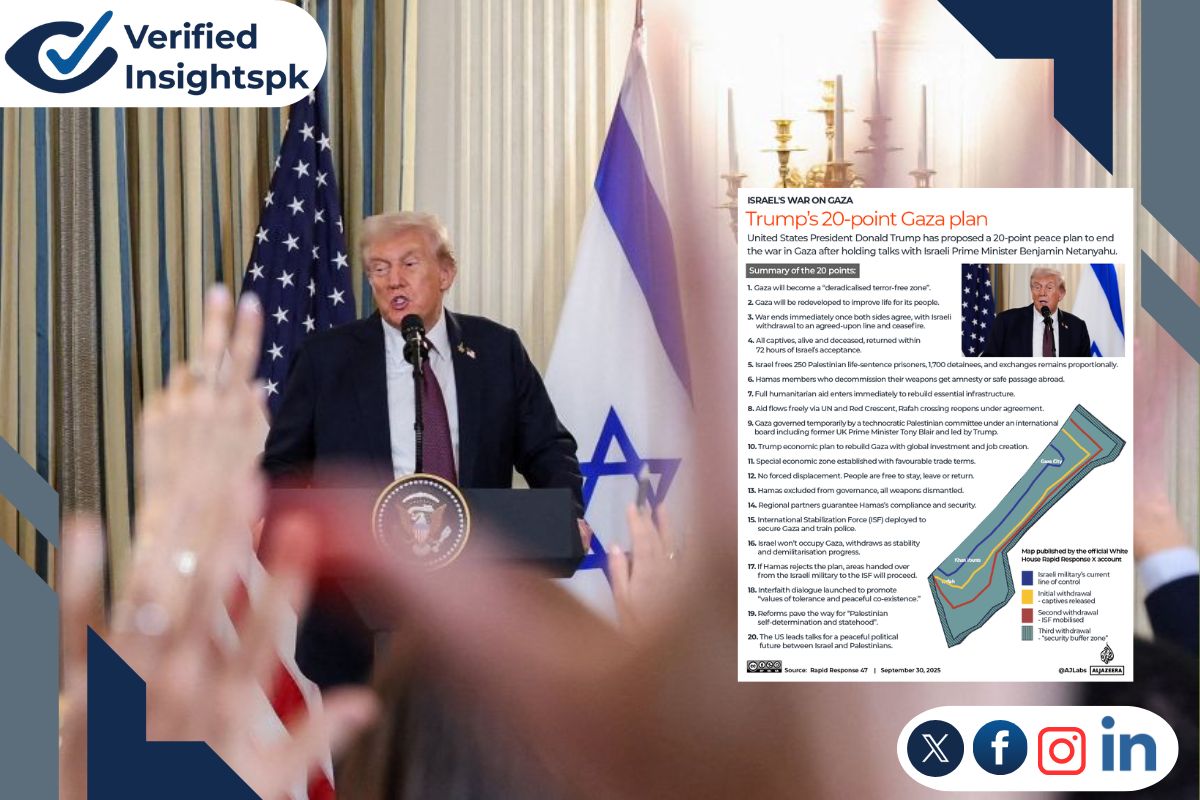
So far, most of Trump’s 20-point Gaza peace plan remains primarily on paper, not in action. Many elements are not yet implemented, and several are facing strong resistance. Below is what is really happening now, along with doubts and signals from both sides.
What is happening so far
- Israel has publicly accepted the plan. Netanyahu backed it in a joint announcement.
- Trump has given Hamas a deadline of three to four days to respond or face consequences.
- Violence continues in Gaza even after the plan was announced. Israel carried out strikes against Palestinian areas, causing casualties. This means the ceasefire terms are not being respected yet.
- Hamas has rejected or is demanding key revisions to the proposal, especially the parts about disarmament and giving up governance.
- Many Muslim and Arab nations have welcomed the plan and signaled support, but with reservations. They have not fully committed to every clause.
- Critics argue the plan favors Israel over Palestinians, giving Israel too much control and vague guarantees.
Doubts & challenges: Are they just “empty talk”?
- Many of the plan’s clauses, such as a complete Israeli withdrawal or demilitarizing Hamas, depend on mutual trust. That is rare in this conflict.
- Some view the idea of a transitional governing board led by Trump and Blair as a form of disguised foreign control under the guise of aid.
- Some points are vague or unclear, such as timelines, checks, or enforcement mechanisms. Without these, who enforces rules?
- Hamas was not included in negotiating the plan, yet it is required to carry out many of its terms. This is seen as unfair.
- The ongoing war on the ground challenges the plan’s staged implementation. Military operations have continued even after the announcement.
Remarks by Verified Insights PK
We see Trump’s 20-point plan as a mix of hope and caution. On one hand, it offers Gaza a chance for peace, aid, and rebuilding. On the other hand, it places heavy control in the hands of the US and Israel, reducing Palestinian independence.
From the lens of Verified Insights PK, the truth is this: most of these 20 points are aspirational, not yet real.
They sound bold, but turning them into reality requires cooperation from Israel, Hamas, regional powers, and the international community. Right now, the war in Gaza is continuing, the conflict is ongoing, and many of the plan’s protections are missing.
For Pakistan and other Muslim countries, supporting parts like humanitarian aid and hostages’ release is easier than committing to sending troops or accepting foreign-led governance. The real test will come when we see whether Israel actually withdraws, Hamas decommissions weapons, and Gaza becomes governed transparently. Until then, we must treat these points skeptically, hopeful words, but not yet solid actions.
Conclusion
Trump’s Gaza Peace Plan is historic but controversial. It offers peace, aid, and development, but also limits Palestinian control. Israel has already agreed, but Hamas’s response will decide the future.
For Gaza, this could mean the end of war or the start of a new struggle under international control. For Muslim countries, especially Pakistan, the plan demands a balance between humanitarian support and political principles.
In the end, the people of Gaza must decide whether this plan is a path to freedom—or just another stage of dependence.


